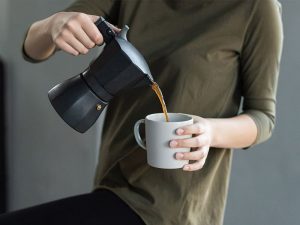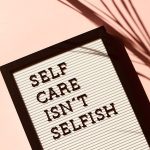How to Kick Your Addiction to Caffeine to the Curb
Do you love starting your day with a hot cup of coffee or tea? Does just the thought of it give you warm fuzzies? Would you agree the way to your heart is a gift card to a coffee shop?
Does every meme about leaving you alone until you’ve had your coffee resonate with you?
Have you asked yourself why you love it so much? The taste? The caffeine effects? The morning ritual?
Do you like your caffeine cold and with bubbles? AKA soda.
Or maybe in a tiny “5-hour energy” shot?
Or maybe…those yummy pieces of chocolate?

Yes, caffeine does reduce fatigue, keep you more awake and alert, and improve focus. It’s also used in many prescription and over-the-counter medications: headache and pain relievers, and cold medicines.
But, caffeine can also have a negative effect on your body.
- Nervousness
- “The Jitters”
- Insomnia
- Dehydration
- Abnormal heartbeat
Have you been thinking about cutting back your caffeine intake or quitting altogether?
There are many reasons why that’s a great idea:
- Financial Benefits – get out your calculator and add up your daily drinks. You might be surprised how much you spend on your caffeine habit
- Lower Blood Pressure
- Lower Anxiety
- Better Sleep – caffeine can stay in your system for up to 10 hours after your last cup of coffee
- Better Teeth – yes, your teeth are getting stained from the coffee and tea
- Weight Loss – get out your calculator again and add up those calories
- Better Digestion
- Fewer Trips to the Bathroom – since caffeine is a natural diuretic, you urinate more – during the day and at night. Doesn’t a good night’s sleep sound wonderful?
Whatever your reason for kicking your caffeine addiction, here are a few pointers on how to go about it safely and with fewer side effects.
The #1 suggestion: DON’T GO COLD TURKEY
If you want to experience caffeine withdrawals at its finest (or worst), depending on how you look at it, give it a swift kick to the curb and walk away. You’ll most likely be right back on the caffeine-train, because avoiding withdrawal symptoms is one of the most common reasons people decide, “You know what? I think I’ll just keep drinking coffee.”
Do you know some of the symptoms of caffeine withdrawal?
- Headache
- Fatigue
- Depression
- Constipation
- Insomnia
- Irritability
- Dizziness
- Anxiety
- Nausea and vomiting
The easiest and most successful way of quitting caffeine is to do so gradually.
Start slow – really slow
- Decrease the amount of coffee you consume in a day
- For example: If you drink four cups every day, try drinking only three cups a day for a week and the next week drop to two and so on
- What? Caffeine doesn’t just come in the form of drinks? If you’re serious about removing caffeine from your body, keep a food diary and find out what other foods you’re consuming have caffeine
- Check out this caffeine chart
- Try not to get discouraged – becoming caffeine-free will take a few weeks
Replace it with something else
- Drink decaf coffee, herbal tea, seltzer, fruit juice, water
- Exercise – yep, it’s a natural stimulant
- If you need a pick-me-up, go for a quick walk outside during lunchtime
Stay hydrated
- It might seem the answer to everything is water, and that’s because it pretty much is
Quitting caffeine is not easy, and you may have setbacks, but if you’re serious about kicking your addiction, don’t give up. Remember, a caffeine-free lifestyle has many health and wealth benefits.
You got this!








